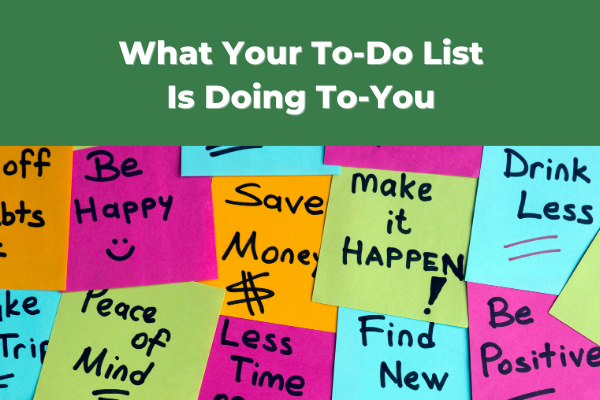Ahh, the to-do list.
The piece of paper or electronic note that holds so many lives together.
The tried-and-true organizer responsible for the success of most everyone.
The bastion of every productive person’s performance.
Except, it’s not all that.
Breaking my reliance on my lists has been a very difficult lesson for me to learn and habit to undo. Thankfully, there’s still a modified role for them!
In this week’s post, let’s see if I can convince you that your precious list is keeping you stuck!

Much Ado About Your To-Do
Why am I making such a big fuss about something so simple and seemingly innocuous?
Because we use to-do lists to run our lives. They’re actually kind of a big deal!
Said every to-do list ever!
So let’s take a look at a typical use case for a to-do list.
Use It Or Never Lose It
The primary purpose of a to-do list is to capture all the tasks you can think of that need to get done.
It’s essentially the dumping ground for your brain. Once written down you don’t have to worry about keeping the task in your working memory.
The second major function is to make sure major or urgent tasks don’t get missed.
Notice how I didn’t say that the point of a to-do list is to actually get those things done?
That’s because it isn’t. More on that in a bit.
There are other secondary benefits, but they’re unfortunately not intrinsic to keeping the to-do list and require further discipline and system implementation.
These potential benefits include:
- Helping you get more organized
- Helping you plan
- Helping you prioritize action
The Unwritten To-Do Item
For many (myself included up until recently), to-do lists also serve as a means to self-judge.
We often base how successful we feel or our day was on the number of items crossed off of our to-do lists. Sound familiar?
If we cross off three things, for example, then today goes in the win bucket and our self-worth gets a boost. If we cross off too few or no things, then we scold and pity ourselves for our failure.
Although some of us have a sneaky way around this latter scenario where we add things to the to-do list that we’ve already accomplished just to cross them off to feel better about ourselves!
Why do we tie our self-worth to the number of items we can cross of off our to-do lists?
You could have had an otherwise amazing day, then took a quick peek at your to-do list, and drowned your joy in despair in the fact that x, y, or z didn’t get done.
All that changed was that you looked at a list and decided that your day was ruined! How does that make sense?
Why do we do that to ourselves?
What if we didn’t do this? Just food for thought.
There's Too Many of Them!
For those who use a to-do list to try to organize their lives, they often face a long, daunting (not to mention disorganized) list that only leaves them feeling overwhelmed.
After all, the list keeps growing longer and longer, faster than items can be addressed and crossed off.
Many get light-headed just reviewing the sheer number of items on the list. How is that helpful?
One of my historical issues with to-do lists is forgetting to review them! Imagine how much utility I was getting out of my lists when I wouldn’t even look at them!
Moreover, it can be confusing to have multiple different to-do lists (e.g., one for work, one for home, one for kids’ activities, etc.) and how they interplay. This generates confusion.
Finally, as alluded to earlier, a to-do list does not help us prioritize the list of tasks
Getting Things To-Done
Jotting down to-do list items does not help them get done because…the act of writing down a task does not complete it.
Two consecutive Stars Wars GIFS? You’ve got some nerve….
In fact, the opposite can be true!
We can counterintuitively feel productive just by writing tasks down instead of putting time into doing those tasks. This is a form of buffering (notice how I can link to buffering in just about every blog post—it’s such a great concept)!
Unfortunately, after doing your brain dump and generating your list, you may get stuck in how to execute on it.
To-do lists can become similarly fruitless. And if they’re not helping you and instead only causing you stress, then they’re having a net negative impact on your life.
Now, that does not have to be the case. A to-do list can be a great first step towards getting things done, but only as the first step as part of a larger strategy.
So how can a to-do list be leveraged to actually help you get stuff done?
Stay tuned for next week’s post!
Do you rely on to-do lists? How effective are you at getting things done with your to-do lists? I’d love to hear your thoughts on this issue. Let me know in the comments section below.
If you haven’t subscribed to my email list, then do so below so you don’t miss my new posts or my weekly updates (only for subscribers).
I’d also be most appreciative if you shared this post with anyone whom you think would benefit from the content or message of the blog.
